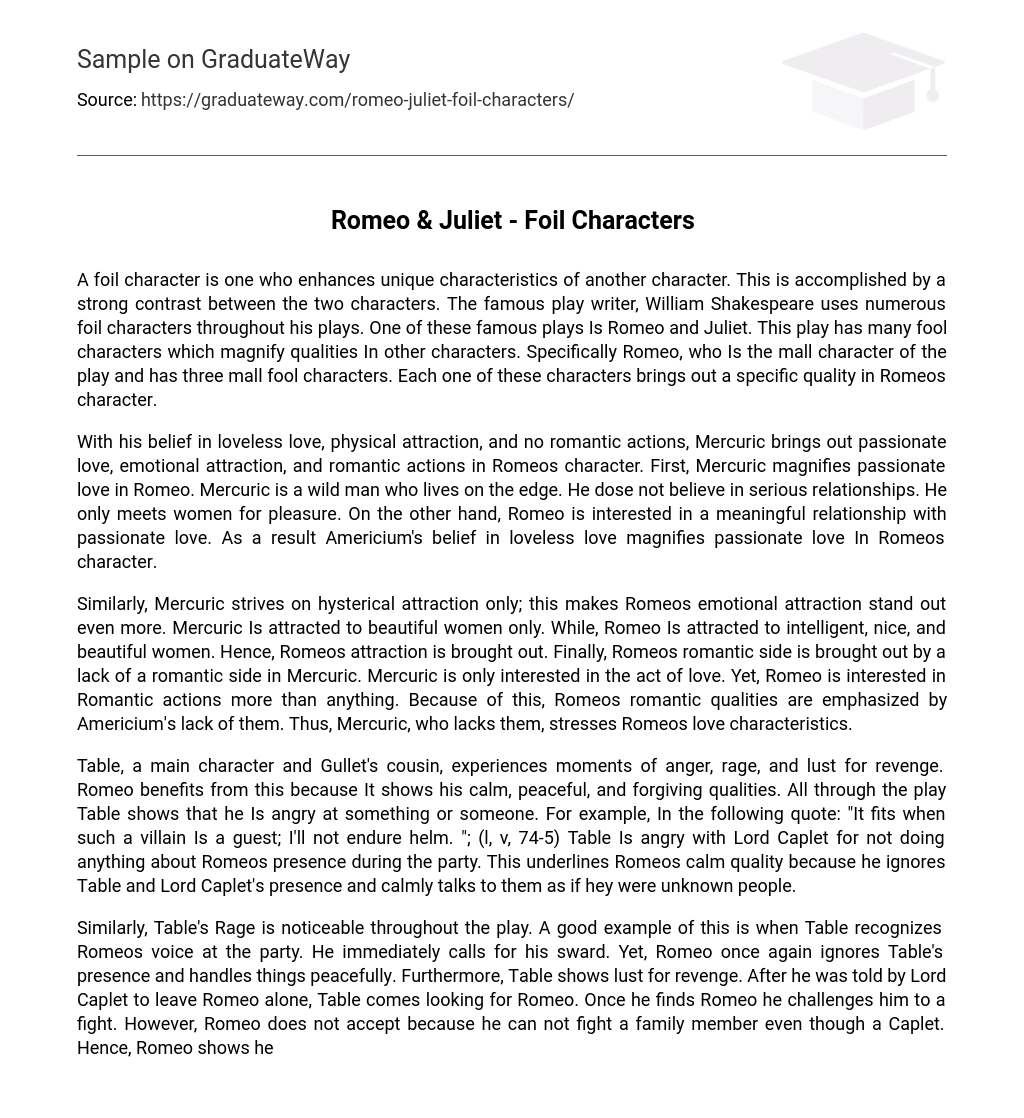A foil character is a character who amplifies the distinctive traits of another character, achieved through strong contrast between the two characters. William Shakespeare, the renowned playwright, employs various foil characters in his plays, including his famous work Romeo and Juliet. In this play, several foil characters highlight qualities in other characters, particularly Romeo. As the main character of the play, Romeo has three significant foil characters, each of whom emphasizes a specific aspect of his character.
Mercuric challenges conventional beliefs about love, emphasizing physical attraction and dismissing the notion of romance. However, his influence on Romeo brings forth a different side of love – one filled with intense passion, emotional connection, and romantic gestures. Romeo, in contrast to Mercuric’s indifferent approach to relationships, seeks a deeper and more meaningful connection based on passionate love. Consequently, Mercuric’s belief in loveless love serves to amplify the presence of passionate love within Romeo’s character.
Similarly, Mercuric is solely attracted to beautiful women, emphasizing Romeo’s emotional attraction even more. On the other hand, Romeo is attracted to intelligent, kind, and beautiful women. Consequently, Romeo’s attraction is highlighted. Moreover, Romeo’s lack of a romantic side is contrasted by Mercuric’s lack of interest in romance. Mercuric is solely focused on the physical act of love, whereas Romeo prioritizes romantic gestures above all else. As a result, Americium’s absence of romantic qualities serves to accentuate Romeo’s love characteristics. Hence, Mercuric’s lack thereof emphasizes Romeos’ romantic nature.
Table, Gullet’s cousin, experiences anger, rage, and vengeful desires. Romeo benefits from this as it highlights his calm, peaceful, and forgiving nature. Throughout the play, Table consistently displays anger towards something or someone. One instance is shown in the following quote: “It fits when such a villain Is a guest; I’ll not endure helm.” (l, v, 74-5). In this scene, Table is upset with Lord Caplet for not taking action against Romeo’s presence at the party. This juxtaposition emphasizes Romeo’s calm demeanor as he disregards Table and Lord Caplet’s presence and speaks to them calmly as if they were strangers.
Throughout the play, Table’s Rage is evident. This is demonstrated when Table identifies Romeo’s voice at the party and quickly reaches for his sword. However, Romeo disregards Table’s presence and manages the situation peacefully. Additionally, Table exhibits a strong desire for revenge. Despite being instructed by Lord Caplet to leave Romeo alone, Table seeks out Romeo and provokes him to fight. Nevertheless, Romeo refuses to engage in combat with a family member, emphasizing his capacity to forgive even his most formidable adversaries.
Table’s anger, rage, and lust for revenge emphasize Romeo’s calm, peaceful, and forgiving qualities. Benevolence, a Montague, is a unique character who contrasts with Mercutio and Tybalt. He demonstrates that Romeo is still capable of anger, rage, and defiance of the law. To do this, Benevolence emphasizes Romeo’s negative traits by portraying himself as exceptionally peaceful, calm, and obedient to the law. Firstly, Benevolence highlights Romeo’s rage by displaying his own extreme peacefulness. For example, Mercutio was equally close to both Romeo and Benevolence; however, Benevolence did not become filled with rage towards Tybalt when he killed Mercutio, as Romeo did.
The text illustrates how Benevolence’s peaceful character contrasts with Romeo’s rage, and how Venison’s calm demeanor brings out Romeo’s anger. Romeo becomes increasingly angered by Table during his absence, and upon seeing him again, he exclaims, “Alive in triumph, and Mercuric slain! Away to heaven, respective lenient, And fire-eyed fury be my conduct (Ill, I, 122-4).” This reaction may be expected, but Benevolence’s response is not as intense, thereby amplifying Romeo’s anger.
Finally, Romeo’s defiance of the law is heightened by the lawful character of Venison. This is demonstrated when Benevolence states: “We talk here in public haunt of men: Either withdraw unto some private place, Or reason coldly of your grievances, Or else depart. Here all eyes gaze on us.” (Ill, I, 49-52) Benevolence recalls the prince’s words and advises against engaging in a public fight. Despite being aware of the new law and receiving this reminder, Romeo still ends up fighting Table. As a result, Romeo’s actions are magnified because Benevolence both warned him and followed the law.





